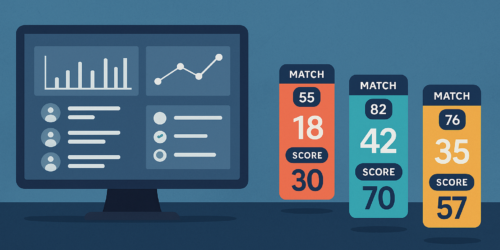What's in this article?
In the current dynamic landscape of sales, the ability to accurately forecast and prioritize leads has become more crucial than ever. Traditional methods of lead scoring, primarily based on static parameters and manual inputs, are increasingly proving to be inadequate for modern demands. Predictive scoring, powered by artificial intelligence (AI) and machine learning (ML), offers a compelling alternative, transforming how sales teams manage their leads.
The Traditional Approach to Lead Scoring
Conventional lead scoring methods have long relied on assigning scores based on set criteria. These include factors like demographic details and historical engagement levels. While effective in providing a rudimentary understanding of lead quality, these methods come with significant limitations:
- Static and Manual Nature: Traditional methods require frequent manual updates to maintain relevance, which introduces human bias and the potential for errors.
- Lack of Flexibility: These methods struggle to adapt to the rapidly changing behaviors of modern buyers and shift in market dynamics.
Why AI-Powered Predictive Scoring is Superior
Predictive scoring utilizes complex algorithms to analyze large datasets, detecting patterns and assigning scores based on the likelihood of a lead converting. Here’s why this approach is favored by forward-thinking sales teams:
Data-Driven Precision
- Advanced Pattern Recognition: AI models excel in identifying conversion signals by evaluating historical data, customer interactions, and behavioral patterns across various channels.
- Continuous Adaptation: Unlike their static counterparts, AI systems dynamically adjust to new information, providing increasingly accurate predictions over time.
Improved Efficiency and Resource Allocation
- High-Quality Lead Detection: By interpreting behavioral and demographic signals, predictive models enhance the accuracy of lead qualifications.
- Optimal Resource Allocation: Sales teams can concentrate their efforts on high-scoring leads, maximizing the return on investment and boosting overall sales efficiency.
Implementing Predictive Scoring: Best Practices
- Comprehensive Data Integration: Consolidate data from all customer interactions into a unified system, including CRM inputs, marketing tools, and sales logs.
- Regular Model Updates: Consistently update AI models with new data to ensure their predictions remain accurate and relevant.
- Effective Change Management: Facilitate a smooth transition for sales teams from traditional scoring methods to AI-driven processes through robust training and continuous support.
Case Study: ProPair’s Success with Predictive Scoring
ProPair’s implementation of AI-powered predictive scoring has resulted in significant improvements across multiple metrics:
- 83% Increase in Re-engagement: One lending institution enhanced its re-engagement rates markedly by employing precise lead scoring techniques.
- Higher Return on Investment: Clients using ProPair’s AI tools report a 20-40% improvement in performance, as historical data is transformed into actionable insights.
Advancing Sales Strategy with Predictive Scoring
Adopting predictive scoring is not merely about replacing old methods—it’s about gaining a strategic edge. AI technology’s evolution means sales teams opting for predictive models can not only enhance lead conversion rates but also significantly improve customer lifetime value.
Related Reading
A Strategic Move Forward
To remain competitive, sales teams must embrace predictive AI systems. Discover how these innovative solutions can redefine your approach to sales and lead management. Connect with us to learn more about transforming your sales strategies with AI.
FAQ
What is predictive lead scoring?
Predictive lead scoring leverages machine learning algorithms to evaluate and rank leads based on their likelihood of conversion using historical and real-time data across multiple customer interactions.
How does predictive scoring improve lead management?
By providing more accurate lead evaluations, predictive scoring allows sales teams to prioritize high-value opportunities and allocate resources more efficiently, enhancing overall sales efficiency.
Can predictive scoring be integrated with existing CRM systems?
Yes, predictive scoring models are designed to integrate seamlessly with most CRM systems, facilitating streamlined operations and enhanced data insights.



